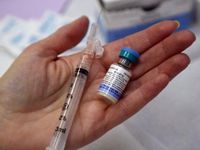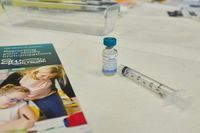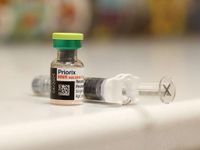Ontario is grappling with a significant resurgence of measles, reporting 155 new cases over the past week alone. This brings the total case count to 816 since the outbreak began in the fall of 2024, marking the largest outbreak in the province since measles was declared eliminated in Canada in the 1990s. Health officials are increasingly concerned as the number of cases rises after a brief period of stabilization that had led to some cautious optimism.
Public Health Ontario has indicated that there have now been 61 hospitalizations associated with the outbreak, which is 11 more than last week. Alarmingly, 47 of these hospitalized patients are children, predominantly from unimmunized groups. The outbreak has primarily affected Ontario's southwestern public health unit, but it has now spread to additional areas, including Hamilton and Northeastern Ontario, which covers Timmins and Englehart.
Dr. Ninh Tran, the medical officer of health for Southwestern Public Health, reported a 130 percent increase in measles vaccinations at local public health clinics from January to April 2025 compared to the same period last year. This translates to an additional 940 doses administered. Tran noted that schools have begun issuing suspensions this week to some of the thousands of students who are not fully vaccinated. He emphasized the urgent need for the province to digitize its immunization record system, stating, "An electronic vaccine registry would be absolutely critical to better understand vaccine coverage."
In a related development, the New York State Department of Health issued a travel advisory on April 2, warning residents that measles is only a car ride away, urging them to ensure they are vaccinated before traveling to Ontario. The advisory highlighted the ease with which the virus can spread, noting that around 90 percent of unvaccinated individuals exposed to the virus will become infected.
Measles, which begins with symptoms such as fever, cough, runny nose, and red watery eyes, can lead to severe complications including pneumonia, encephalitis, and even death. The outbreak has drawn attention not only in Ontario but also in neighboring states, where health officials are monitoring the situation closely. For instance, nearly 500 measles cases have been reported in the United States in the first three months of 2025, surpassing the total number of cases for all of 2024.
Dr. Susy Hota, division head for infectious diseases at the University Health Network, expressed her concern, stating, "I haven't seen numbers like that in my career, so it's very disturbing to see that." She attributed the outbreak to declining vaccination rates, which have been exacerbated by the COVID-19 pandemic. "It was always a background worry that vaccine-preventable diseases like measles could come back and have a resurgence if the vaccination levels were low enough," she added.
The ongoing outbreak has starkly illustrated the consequences of waning immunization coverage. In the past, Ontario recorded only 101 confirmed measles cases over a span of ten years from 2013 to 2023. The current outbreak has resulted in more cases in less than six months than the previous decade combined.
Although the outbreak began with a gathering in a Mennonite community in New Brunswick, which was declared over in January 2025, the spread in Ontario has continued. Cases have now been reported across 15 health units, with Southwestern Public Health accounting for 40 percent of the total cases. The health unit that covers Oxford and Elgin counties, Woodstock, and St. Thomas has reported 343 cases since October 2024, with 31 requiring hospitalization.
The Centers for Disease Control and Prevention (CDC) has also noted that the resurgence of measles is linked to increased global activity, with outbreaks reported in various countries including Yemen, Pakistan, India, and Romania. The interconnectedness of travel has made it easier for the virus to cross borders, prompting health officials to call for renewed efforts in vaccination.
In response to the outbreak, health officials are urging parents to ensure their children are vaccinated. Dr. Tran has advised, "If your child is already four and awaiting their second dose, don’t delay getting it, especially if you live, travel, play, or worship in an area such as ours experiencing a measles outbreak."
As the situation continues to evolve, the emphasis remains on vaccination as the best defense against the highly contagious virus. With the spring and summer travel season approaching, health officials are particularly concerned about the potential for further spread as unvaccinated individuals travel.
In summary, the measles outbreak in Ontario serves as a stark reminder of the importance of maintaining high vaccination rates to prevent the resurgence of vaccine-preventable diseases. As communities grapple with the implications of the outbreak, the push for a digital vaccine registry and increased public awareness about vaccination is more critical than ever.







